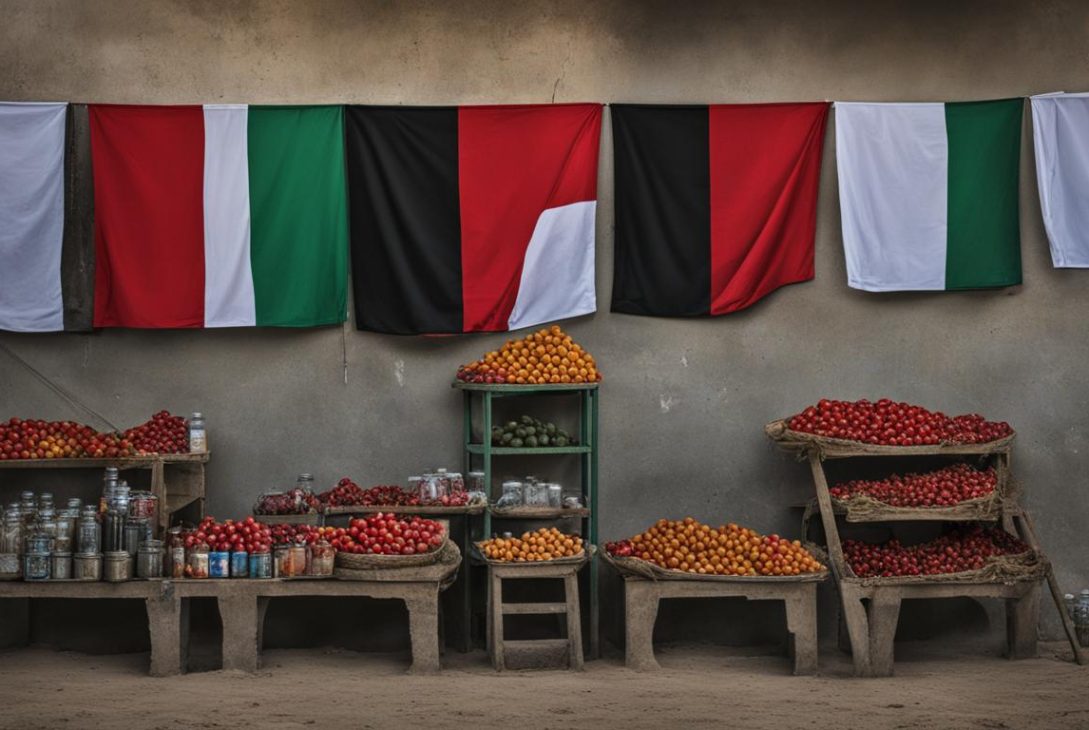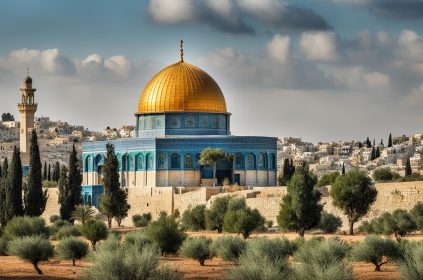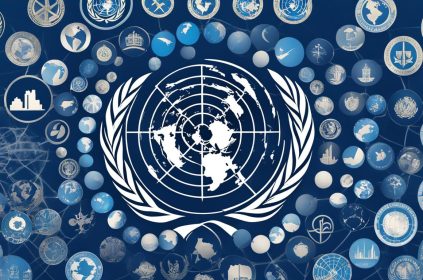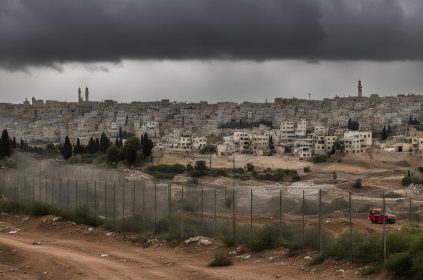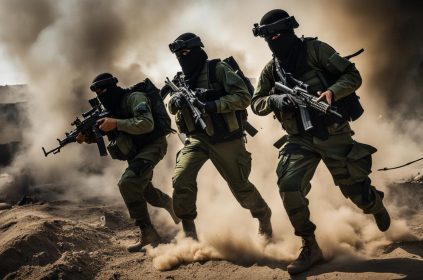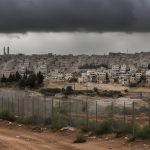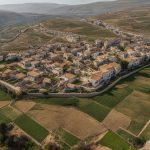The Gaza blockade, in place for 11 years, has had a devastating impact on the lives of Palestinians in the Gaza Strip. This article will delve deeper into the origins of the blockade, its impacts on the people of Gaza, and the ongoing issues surrounding it.
Key Takeaways:
- The Gaza blockade has severely limited access to resources for Palestinians in the Gaza Strip.
- It has caused a humanitarian crisis, affecting education, healthcare, employment, and food security.
- The blockade has had a major impact on the economy, leading to a high unemployment rate in Gaza.
- The lack of job opportunities and limited access to resources have stifled economic growth.
- The international community has responded with varying degrees of support and criticism towards the blockade.
The Economic Impact of the Gaza Blockade
The Gaza blockade has had a profound economic impact on the region, causing widespread unemployment and hindering economic growth. The unemployment rate in Gaza is one of the highest in the world, with nearly half of the working-age population unable to find employment. The lack of job opportunities and limited access to resources have created a cycle of poverty and dependence, with many people struggling to make ends meet.
The blockade has also had a detrimental effect on trade and commerce in Gaza. The restrictions on the movement of goods and people have made it difficult for businesses to thrive and hampered the growth of the private sector. The limited access to markets and essential resources has further constrained economic activity in the region.
“The economic impact of the Gaza blockade cannot be overstated. It has devastated our livelihoods and limited our ability to provide for our families,” says Ahmed, a resident of Gaza.
The Gaza blockade has created an economic crisis that extends beyond individual households. The lack of economic opportunities has hindered the overall development of the region, resulting in a stagnant economy and limited prospects for future growth. The ongoing challenges posed by the blockade highlight the urgent need for a comprehensive solution that addresses the economic needs of the people of Gaza.
The Economic Impact of the Gaza Blockade
| Key Indicators | Impact |
|---|---|
| Unemployment Rate | Approximately 50% |
| Gross Domestic Product (GDP) Growth | Negative growth rate |
| Trade and Commerce | Significantly restricted |
The Humanitarian Crisis in Gaza
The Gaza blockade has created a severe humanitarian crisis in the Gaza Strip, impacting the lives of Palestinians in multiple ways. The people of Gaza face significant challenges in accessing basic needs such as food, water, healthcare, and education. The United Nations has raised concerns about the dire situation resulting from the blockade, emphasizing the urgent need for international intervention.
One of the key issues resulting from the blockade is the lack of access to sufficient food and clean drinking water. Despite receiving food assistance, many Palestinians in Gaza struggle to provide enough food for their families. Additionally, less than 16% of water in Gaza is drinkable, leading to a shortage of clean water for the population.
The blockade has also hindered access to healthcare services, exacerbating the health crisis in the region. Limited availability of medical supplies and restricted movement make it challenging for Palestinians in Gaza to receive adequate medical care. The blockade has further hampered the development and maintenance of healthcare infrastructure, intensifying the strain on an already fragile healthcare system.
The United Nations has repeatedly highlighted the urgent need to address the humanitarian crisis in Gaza resulting from the blockade. The international community must work together to find sustainable solutions that prioritize the well-being and rights of the people of Gaza.
International Response to the Gaza Blockade
The Gaza blockade has garnered a mixed response from the international community, with various countries and organizations expressing both support and criticism. Those in favor of lifting the blockade emphasize the severe impact it has had on the people of Gaza, citing concerns about the humanitarian crisis and the infringement of human rights. These voices argue that the blockade has exacerbated poverty, hindered access to essential services, and created an unsustainable living situation for Palestinians in the region.
On the other hand, proponents of the blockade argue that it is a necessary measure for security reasons. They highlight the ongoing conflict in the region and the need to prevent the smuggling of weapons into Gaza as justification for the blockade. These countries and organizations assert that lifting the blockade could pose a threat to regional stability and the safety of Israeli citizens.
While there have been multiple calls to end the blockade by the United Nations and other international bodies, finding a consensus on this issue has proved challenging. The complex political dynamics in the region contribute to the ongoing debate surrounding the Gaza blockade.
Despite differing opinions, it is clear that the international community recognizes the need to address the challenges posed by the blockade and alleviate the suffering of the people of Gaza. Efforts have been made to provide humanitarian aid and support to the region, with organizations like the United Nations and Oxfam leading relief efforts. However, more needs to be done to ensure the well-being and rights of the people living under the blockade.
The ongoing discussions and negotiations surrounding the Gaza blockade reflect the complex nature of the conflict in the region. Seeking a resolution that balances the security concerns of all parties involved while prioritizing the human rights and well-being of the people of Gaza remains a significant challenge.
The Political Situation in Gaza
The political situation in Gaza is a complex and deeply contentious issue that greatly impacts the lives of its residents. The region is divided between Hamas, a Palestinian political party and militant group, and the Palestinian Authority. This division has created significant challenges and hindered efforts to resolve the issues surrounding the Gaza blockade. The conflicting agendas and political rivalries between these two entities have only served to further exacerbate tensions and prolong the suffering of the people.
The control of Gaza by Hamas has been a major obstacle in achieving a peaceful resolution to the conflict. The group is considered a terrorist organization by many countries and is subject to international sanctions. Its commitment to armed resistance against Israel has resulted in frequent confrontations and military operations, leading to a cycle of violence and retaliation. The political situation in Gaza is not only influenced by internal dynamics but is also shaped by the broader geopolitical context of the Israeli-Palestinian conflict.
Efforts to establish a lasting solution to the political challenges in Gaza have been hampered by a lack of trust and cooperation between the parties involved. The international community, along with various regional actors, has made numerous attempts to mediate and broker peace agreements, but progress has been limited. The unresolved political situation in Gaza continues to have significant implications for the lives of the people residing there, affecting their safety, access to basic services, and overall well-being.
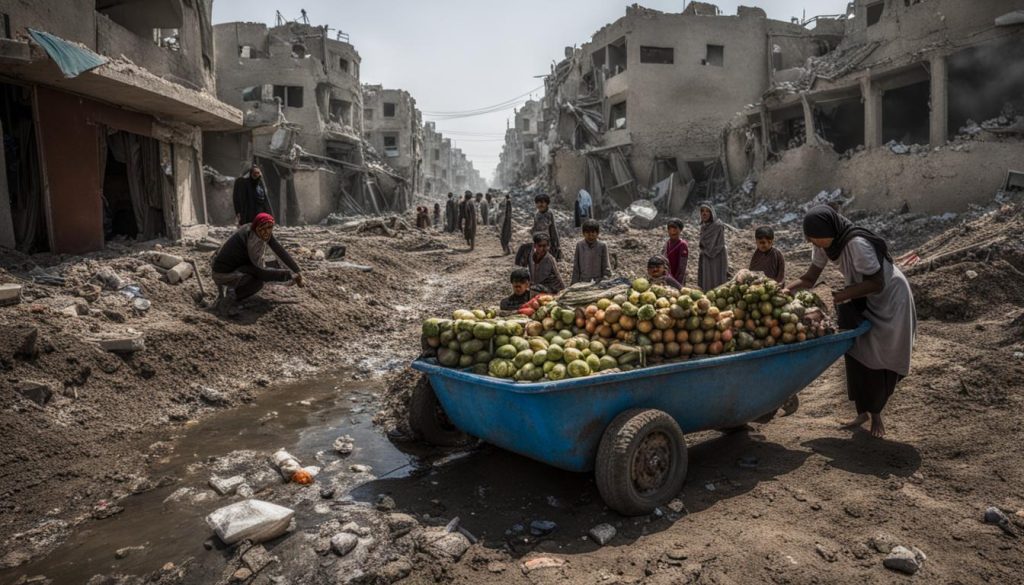
Key Issues in the Political Situation:
- The division of power between Hamas and the Palestinian Authority
- The role of external actors, such as Israel and Egypt, in shaping the political landscape
- The impact of the political situation on the daily lives of the people of Gaza
- The ongoing struggle for political legitimacy and representation
“The political situation in Gaza is a constant source of tension and instability. It is crucial that all parties involved prioritize dialogue, cooperation, and the well-being of the people in order to achieve a sustainable resolution.”
The Origins of the Gaza Blockade
The Gaza blockade, which has been in place for 11 years, has its origins in the Israeli occupation of the Palestinian Territory, which began in 1967. The blockade was intensified in 2007 when Hamas took control of Gaza. Israel, concerned about security threats, implemented the blockade to restrict the movement of goods and people in and out of the region. This decision has had far-reaching consequences for the people of Gaza, who have been subjected to severe limitations and restrictions.
The origins of the Gaza blockade are deeply rooted in the complex political situation in the region. The control of Gaza is split between Hamas, a Palestinian political party and militant group, and the Palestinian Authority. This division has contributed to the ongoing conflict and has hindered efforts to find a resolution to the blockade. The blockade has become a source of tension and conflict between Israel and Palestine, further exacerbating the challenges faced by the people of Gaza.
The origins of the Gaza blockade highlight the intertwined nature of political and security concerns in the region. While Israel argues that the blockade is necessary for security reasons, critics argue that it is a collective punishment imposed on the people of Gaza. The impacts of the blockade on the lives of Palestinians in Gaza cannot be underestimated, as they continue to face a humanitarian crisis and limited access to essential services.
The Impact of the Blockade on the People of Gaza
The origins of the Gaza blockade have had a devastating impact on the lives of Palestinians living in the Gaza Strip. The blockade has severely limited their access to basic resources, such as food, water, and healthcare. It has also hindered economic growth and led to high rates of unemployment. The ongoing political situation and international response to the blockade further complicate efforts to find a resolution and alleviate the suffering of the people of Gaza.
| Impact of the Gaza Blockade | Statistics |
|---|---|
| Unemployment Rate | Almost half of the working-age population in Gaza is unemployed. |
| Access to Food | Many Palestinians in Gaza do not have enough food to feed their families, despite receiving food assistance. |
| Access to Healthcare | The blockade has hindered access to healthcare, resulting in a decline in living conditions for the people of Gaza. |
| Access to Education | Many children in Gaza have limited access to quality education and face challenges in pursuing higher education and future employment opportunities. |
The origins of the Gaza blockade and its ongoing impact on the people of Gaza highlight the urgent need for a comprehensive and collaborative approach to address the issues and challenges posed by the blockade. It is essential to prioritize the well-being and rights of the people of Gaza and work towards finding a long-term solution that ensures their access to essential resources and services.
Ongoing Issues and Challenges
Despite the ongoing international aid and relief efforts, the Gaza blockade continues to present significant challenges and issues for the people of Gaza. The restrictions on movement and limited access to resources have created a cycle of poverty and dependency that is difficult to break. The blockade has severely impacted the economy, leading to high unemployment rates and a lack of opportunities for the working-age population. The limited access to essential resources has also hindered reconstruction efforts in the region, further exacerbating the already dire conditions.
A major ongoing issue is the lack of access to clean drinking water and adequate healthcare services. The blockade has hindered the development and maintenance of healthcare infrastructure, leaving the people of Gaza with limited access to medical care. This has resulted in a health crisis, with many individuals suffering from preventable diseases and inadequate treatment options. Access to clean drinking water is also severely limited, with the majority of water in Gaza being undrinkable. The lack of basic necessities like clean water and healthcare exacerbate the already dire humanitarian situation in the region.
Additionally, the ongoing political situation and lack of progress in finding a resolution to the Israeli-Palestinian conflict further complicate the situation in Gaza. The division of control between Hamas and the Palestinian Authority has hindered efforts to address the issues surrounding the blockade and find a long-term solution. The political instability adds to the challenges faced by the people of Gaza and continues to perpetuate the cycle of poverty and dependency.
Table: Ongoing Issues and Challenges
| Challenges | Impact |
|---|---|
| Poverty and high unemployment rates | Limited economic opportunities and financial instability |
| Limited access to essential resources | Inadequate living conditions and reliance on aid |
| Health crisis | Limited access to healthcare services and clean drinking water |
| Political instability | Hindered efforts to find a resolution and address the issues surrounding the blockade |
Voice From Gaza: Stories of Resilience
Despite the challenges posed by the Gaza blockade, the people of Gaza have shown incredible resilience and determination. Their stories of perseverance and creativity highlight the strength of the human spirit in the face of adversity.
One such individual is Aya, an architect and designer who has found innovative ways to sustain herself and contribute to her community. Despite the economic hardships caused by the blockade, Aya has managed to create handcrafted products using locally sourced materials. Her unique designs have gained recognition both locally and internationally, providing her with a sustainable income and inspiring others to embrace their talents.
“The blockade has limited our access to resources and opportunities, but it has also forced us to think outside the box. Through my designs, I aim to showcase our rich cultural heritage and prove that even in the most challenging circumstances, creativity can thrive,” says Aya.
Another inspiring story comes from Hassan, a teacher in Gaza who has dedicated his life to educating children despite the difficult circumstances. With limited resources and overcrowded classrooms, Hassan has gone above and beyond to provide quality education to his students. He has organized community-based learning initiatives, leveraging the power of collective effort to ensure that no child is left behind.
The stories of Aya, Hassan, and many others like them shed light on the strength and resilience of the people of Gaza. Despite the hardships they face on a daily basis, they continue to strive for a better future, using their skills and talents to create positive change in their communities.
Table: Stories of Resilience from Gaza
| Name | Occupation | Accomplishments |
|---|---|---|
| Aya | Architect and Designer | Created handcrafted products using locally sourced materials, gained recognition locally and internationally |
| Hassan | Teacher | Organized community-based learning initiatives to provide quality education in challenging circumstances |
| Rana | Entrepreneur | Started a successful online business, empowering other women to become financially independent |
| Mohammed | Artist | Used art as a form of expression and activism, shedding light on the realities of life in Gaza |
The stories of resilience from Gaza demonstrate the indomitable spirit of the people and the incredible potential that exists within them. Despite the challenges they face, they continue to inspire hope and create positive change, proving that even in the most difficult circumstances, humanity can triumph.
“We may be confined geographically, but our spirit knows no bounds. We will continue to rise and thrive, no matter the obstacles we face,” says Rana, an entrepreneur in Gaza.
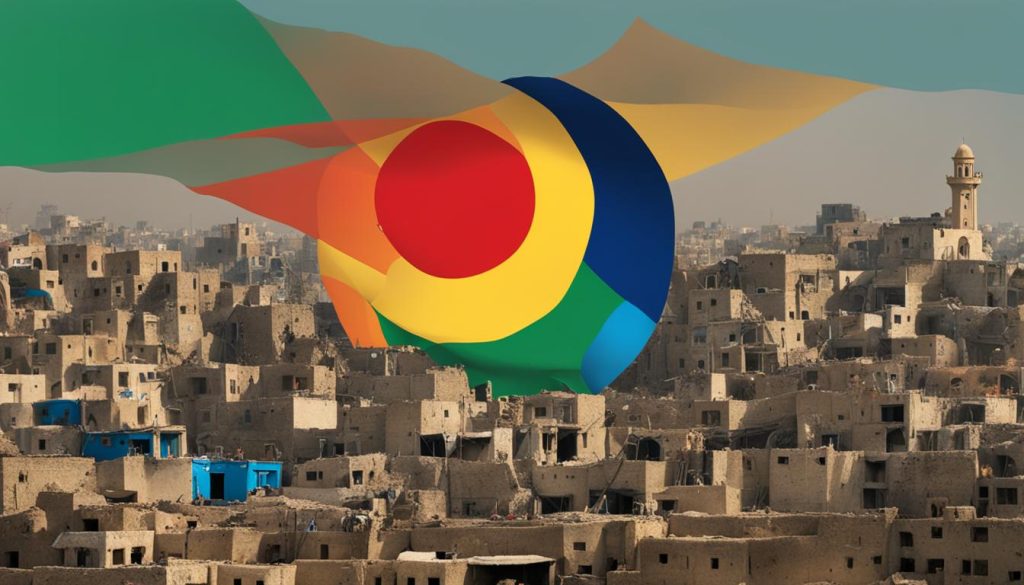
The Impact on Children and Education
The Gaza blockade has had a devastating impact on children and education in the region. Children in Gaza have been particularly affected by the blockade, facing significant challenges in accessing quality education and experiencing disruptions to their learning. The lack of resources and infrastructure has hindered the development of educational institutions, leading to overcrowded classrooms and limited access to educational materials.
According to recent reports, the blockade has resulted in increased dropout rates among students in Gaza. Many children are forced to leave school early to support their families or are unable to attend school due to the economic hardships caused by the blockade. This not only deprives children of their right to education but also hampers their future prospects and opportunities.
“Education is a fundamental right of every child, but the Gaza blockade is denying children in the region this basic human right,” says Sarah Johnson, a humanitarian worker in Gaza.
“The lack of access to quality education and educational materials is hindering the intellectual and emotional development of children, perpetuating a cycle of poverty and dependency.”
| Impact of Gaza Blockade on Children and Education | Statistics |
|---|---|
| Percentage of children in Gaza with limited access to quality education | 82% |
| Dropout rate among students in Gaza | 28% |
| Number of overcrowded classrooms in Gaza | approximately 1500 |
The international community and humanitarian organizations have been working to support education in Gaza by providing funding, educational resources, and teacher training programs. However, the ongoing blockade continues to hinder these efforts, making it crucial to address the root causes of the blockade and find a long-term solution that ensures access to quality education for all children in Gaza.
The Health Crisis in Gaza
The Gaza blockade has had a catastrophic impact on the health of the population, exacerbating an already dire situation. Limited access to healthcare facilities and medical supplies has resulted in inadequate healthcare services for the people of Gaza. The blockade has hindered the development and maintenance of healthcare infrastructure, making it difficult to provide essential medical care.
“The health crisis in Gaza is reaching critical levels,” says Dr. Sarah Ahmed, a medical expert from Doctors Without Borders. “We are seeing a rise in preventable diseases and an increase in mortality rates due to lack of access to proper healthcare.”
The lack of medical supplies and equipment has made it challenging to treat and manage chronic conditions, such as diabetes and cardiovascular disease. Many patients have been unable to receive life-saving treatments, exacerbating their health conditions and leading to unnecessary suffering. The blockade has also prevented medical professionals from accessing training and resources, hindering their ability to provide quality care.
The United Nations has repeatedly called for an end to the blockade and for unrestricted access to healthcare in Gaza. Without immediate action to address the health crisis, the people of Gaza will continue to suffer, and the long-term consequences will be devastating.
International Aid and Relief Efforts
The international community has been actively involved in providing aid and relief efforts to mitigate the devastating impacts of the Gaza blockade. Organizations such as Oxfam and the United Nations have played a crucial role in addressing the humanitarian crisis in the region.
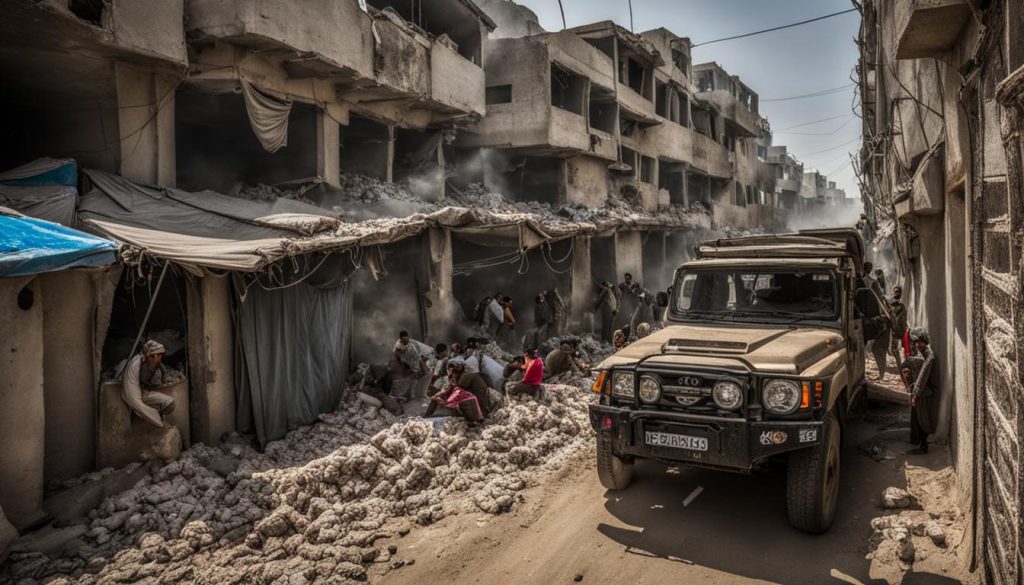
Through their efforts, these organizations have provided essential services such as food assistance, medical aid, and support for education to the people of Gaza. They have worked tirelessly to ensure that basic needs are met and that vulnerable populations receive the assistance they require.
While these international aid and relief efforts have made a significant impact, there is still a pressing need for continued support and resources. The ongoing blockade has created long-lasting challenges that require sustained attention and assistance. Collaborative efforts are necessary to address the complex issues and improve the lives of those affected by the blockade.
Conclusion
The Gaza blockade, which has been in place for 11 years, has had a devastating impact on the lives of Palestinians living in the Gaza Strip. It has created a severe humanitarian crisis, stifled economic growth, and limited access to essential services. The blockade affects every aspect of life in Gaza, from education and healthcare to employment and food security.
Despite international aid and relief efforts, the ongoing issues and challenges posed by the blockade require a comprehensive and collaborative approach. The political situation and the international response further complicate the efforts to find a resolution. Addressing these challenges and ensuring the well-being and rights of the people of Gaza should be the top priority.
The stories of resilience from the people of Gaza highlight their determination to sustain themselves and contribute to their community despite the hardships. However, the blockade continues to hinder the development and growth of the region. It is crucial for the international community to actively engage in finding a long-term solution that will alleviate the suffering caused by the blockade and enable the people of Gaza to rebuild their lives.
FAQ
What is the Gaza blockade?
The Gaza blockade refers to the restrictions imposed by Israel on the movement of goods and people in and out of the Gaza Strip.
How long has the Gaza blockade been in place?
The Gaza blockade has been in place for 11 years, since 2007.
What is the impact of the Gaza blockade on the economy of the region?
The Gaza blockade has led to a high unemployment rate and limited economic growth in the region. Many people in Gaza struggle to find job opportunities and make ends meet.
How has the blockade affected the lives of Palestinians in Gaza?
The blockade has caused a severe humanitarian crisis, affecting access to food, clean water, healthcare, and education. It has also hindered reconstruction efforts and led to a decline in living conditions.
What has been the international response to the Gaza blockade?
The international community has varied in their support and criticism of the blockade. Some countries and organizations have called for its lifting, while others argue for security reasons.
What is the political situation in Gaza?
Gaza is divided between Hamas, a political party and militant group, and the Palestinian Authority. This division complicates efforts to resolve the issues surrounding the blockade.
When and why was the Gaza blockade intensified?
The Gaza blockade was intensified in 2007 when Hamas took control of Gaza. Israel implemented the blockade due to security concerns.
How has the blockade impacted children and education in Gaza?
The blockade has limited access to quality education and hindered future opportunities for children in Gaza. Educational institutions face challenges due to a lack of resources and infrastructure.
What is the health crisis in Gaza and how is it related to the blockade?
Limited access to healthcare facilities and medical supplies has resulted in inadequate healthcare services for the people of Gaza. The blockade has hindered the development and maintenance of healthcare infrastructure.
How have international aid and relief efforts supported Gaza?
Organizations like Oxfam and the United Nations have provided food assistance, medical aid, and other essential services to the people of Gaza to mitigate the impact of the blockade.
Source Links
- https://www.oxfam.org/en/timeline-humanitarian-impact-gaza-blockade
- https://www.unicef.org/mena/documents/gaza-strip-humanitarian-impact-15-years-blockade-june-2022
- https://www.cnn.com/2023/10/15/middleeast/gaza-history-explained-intl/index.html
gaza strip conflict israeli military operation The Economic Impact of the Gaza Blockade The Political Situation in Gaza Understanding the Impacts and Issues of the Gaza Blockade
Last modified: January 17, 2024


